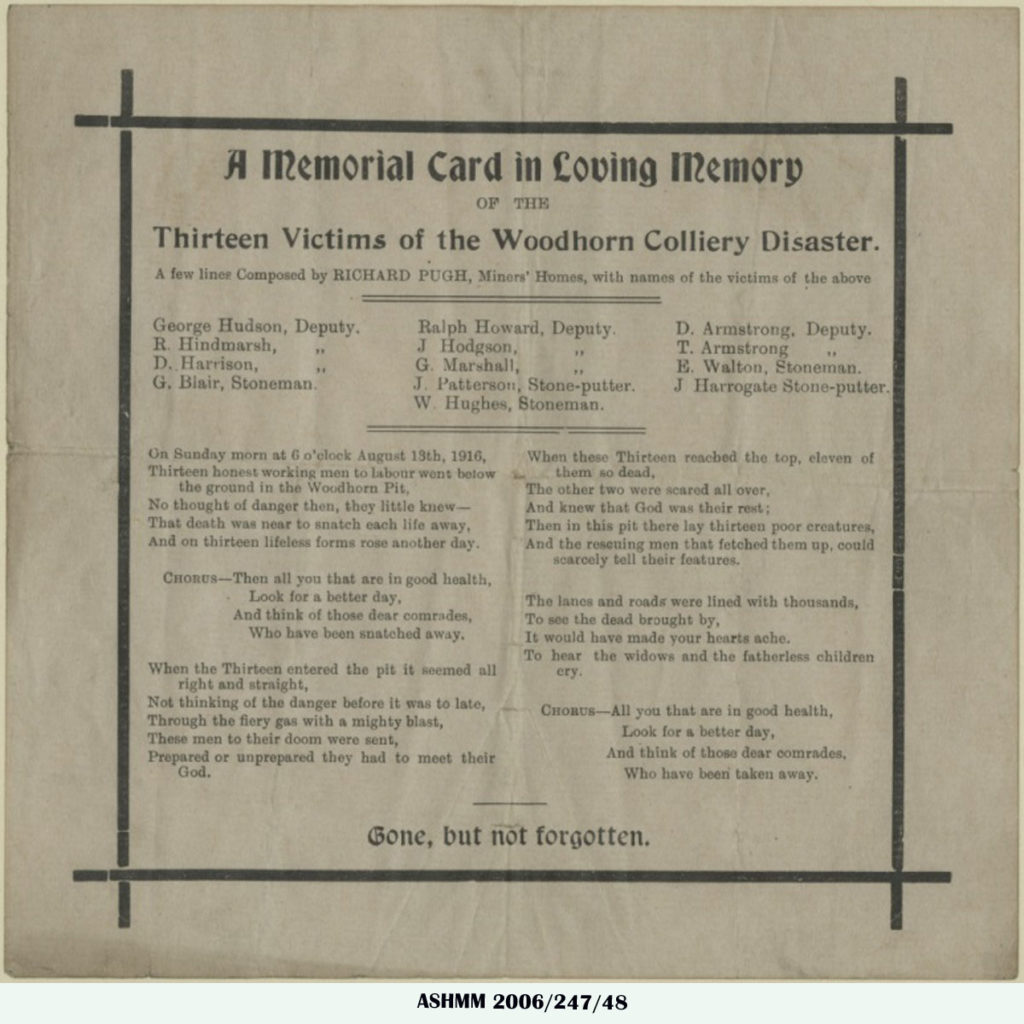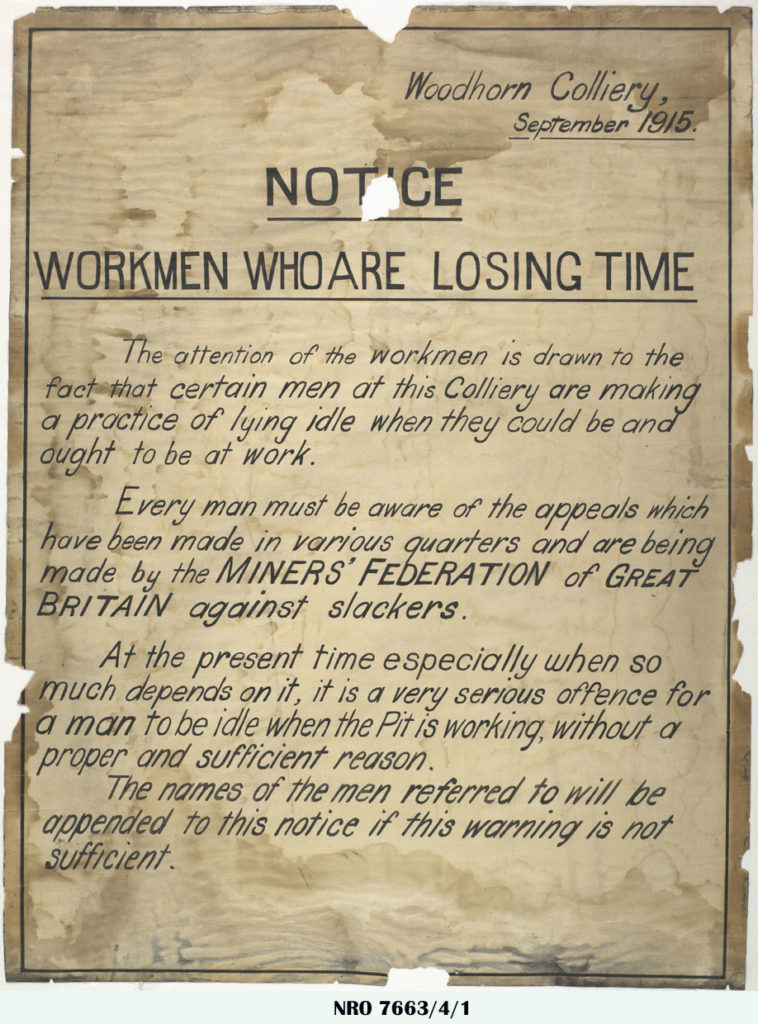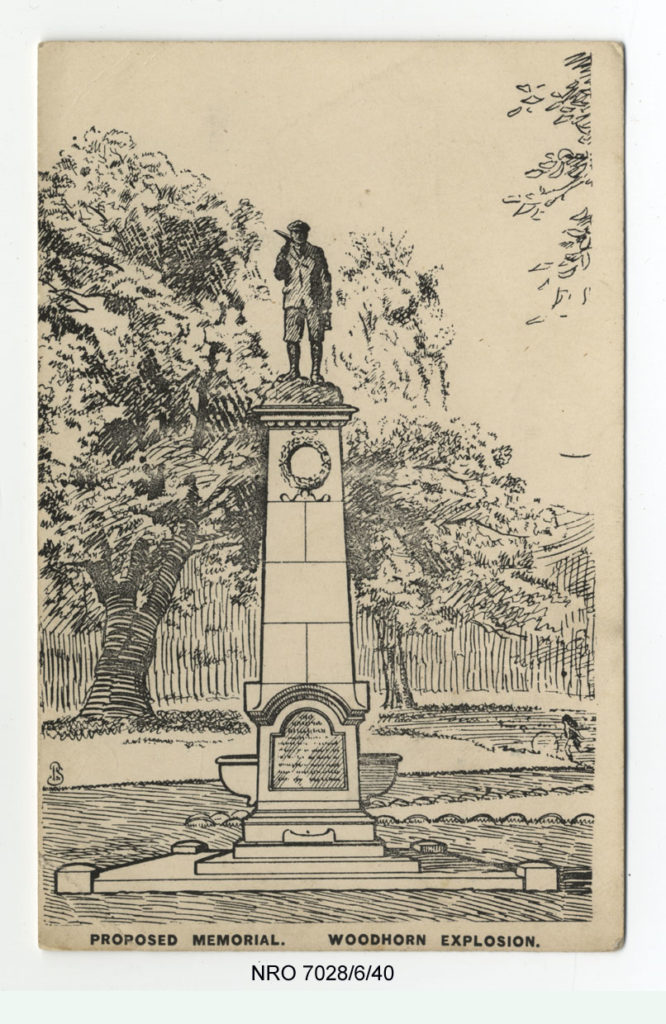
On the morning of Sunday 13th August 1916, an explosion ripped through the Main Seam at Woodhorn Colliery. A party of men working on a ‘repair shift’ were working to set steel girders as roof supports, and as the work was of a special nature, the shift was composed of eight Deputy Overmen, three Stonemen, a Shifter and a Putter.
The men received their instructions in the Low Main Seam at 6am from the Master-shifter, and then proceeded up the drift to the Main Seam. About half an hour after the men left, the master-shifter was aware that something had happened, and he and others went up the drift. They found two men alive but unconscious in the drift below the Main Seam workings; the other eleven men had been killed outright by the explosion.
At the inquest held on 12th, 13th and 21st of September at the Harmonic Hall evidence was gathered from witnesses and the result showed that a catalogue of failures at the colliery had made the disaster inevitable.
The air compressor, which sends a current of air into each working, was not at work on the Sunday morning, this was usual practice at the weekends. On the previous Friday night through to Saturday morning the Capell Fan, the ventilating fan for the underground seams had been stopped for overhauling and repairs. A furnace had been lit to draw the current of air but this method is not so effective for ventilation. On Saturday morning, the fan was turned back on to maximum capacity, but by the night shift, steam power to drive the engine was only at fifty percent its normal capacity as the number of firemen required was down by two, instead of four, this was repeated on Sunday morning when another two firemen were absent from the six needed. This drop in ventilation made any gas present, less likely to be safely dispersed.
Up until the explosion, gas had never been seen in this seam. It seems likely that no thorough inspection for gas was made before the shift started; no written records of any reports were found for this shift, or any of the previous working Sundays.
The Jury of the inquest reported its findings in this way:
“That the 13 men whose names have been repeatedly read – the said deceased men were accidentally killed on the 13th day of August 1916, while working in Woodhorn Colliery by and explosion of gas in the Main Seam, and that such gas had accumulated through want of sufficient ventilation, and exploded through contact with a naked light and before any fall of stone took place. The jury are of the opinion that the management should see in the future that written reposts should be made for every shift, special or otherwise. The jury are also of opinion that there has been a certain amount of laxity on the part of the management for not seeing to sufficient ventilation being maintained”.
Woodhorn Colliery was, even before this time in a state of crisis. The First World War had a massive impact, with 778 men of the 2337 employees leaving Woodhorn Colliery to fight in the conflict. Men were working extra shifts to fill the roles of those fighting and to maximise coal production for the war effort, but this in turn led to illness and absenteeism. Posters issued by the Ashington Coal Company had little effect on absenteeism at any of their collieries and power to prosecute repeated offenders was discussed on 26th July, prior to the explosion. E. W. Milburn, Manager of Woodhorn was in France fighting with the 7th Battalion Northumberland Fusiliers, while the colliery worked under the guidance of J.J. Hall, Agent to the Ashington Coal Company. On 11th August, two days before the explosion, the Ashington Coal Company reported that an application had been made to the Minister of Munitions for the demobilisation of Major Milburn to return as Manager of Woodhorn Colliery.
At the Petty Sessions held at Morpeth on 10th January 1917, charges were brought upon Joseph John Hall, temporary Manager of the Colliery, and Charles Bennett Howe the engine wright, with a failure to provide proper ventilation. The case against both men was dismissed, and the subsequent appeal by the Northumberland Miners Association at the Divisional Bench was also lost.
The Ashington Coal Company was at the time enabling the families of those fighting in the War to stay in their colliery houses; this resulted in fewer houses available to new workers. The Coal Company especially needed the houses of the families of the Deputies who died in the explosion for the new Deputies to move into. As housing was difficult to come by during wartime, wrangling with the families in vacating the houses carried on until the following February, and talk of withholding compensation to the families was mooted by the coal company to force the families out.


